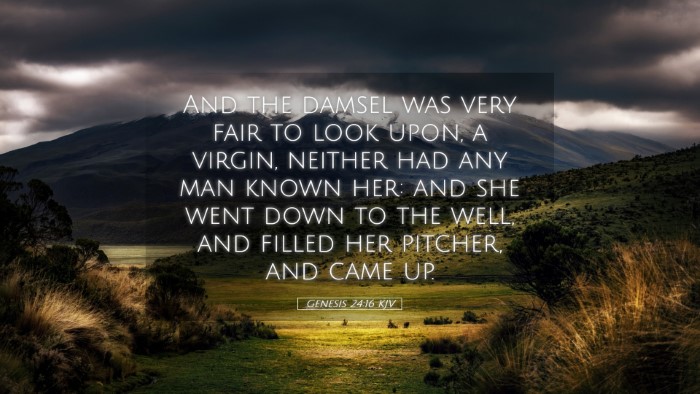Commentary on Genesis 24:16
Verse: "And the damsel was very fair to look upon, a virgin, neither had any man known her: and she went down to the well, and filled her pitcher, and came up."
Introduction
This verse is a significant moment in the narrative of Abraham seeking a wife for his son Isaac. It serves as a critical juncture that illustrates not only the character of Rebekah but also the themes of divine providence and the fulfillment of God’s promises. Commentaries from various respected scholars provide profound insights into the implications of Rebekah’s qualities and actions as well as the broader context of this narrative.
Insights from Matthew Henry
Matthew Henry emphasizes the beauty and virtue of Rebekah, noting that her physical attractiveness is complemented by her purity and innocence. He points out:
- Beauty and Character: "The damsel was very fair to look upon." Henry suggests that while outer beauty is acknowledged, it is her virginity and moral standing that render her desirable. Her purity is pivotal, as it aligns with the covenantal expectations of Abraham's family.
-
- Divine Guidance: Henry highlights the significance of her arrival at the right time and place, illustrating God’s sovereignty and guidance in the matter of finding a suitable wife for Isaac.
Henry concludes that her willingness to serve, as seen in her actions at the well, portrays her character as one of readiness and humility, traits desirable in a matriarch of God's chosen lineage.
Insights from Albert Barnes
Albert Barnes provides a detailed analysis focusing on the cultural and historical aspects surrounding Rebekah’s character. He notes:
- Cultural Context: "A virgin, neither had any man known her." In the ancient Near Eastern culture, a woman’s virginity was of great importance. Barnes emphasizes that the choice of a virgin indicates a choice for moral integrity, critical for the lineage of promise.
- The Well as a Symbol: He observes the well as a place of divine meetings, symbolizing refreshment and sustenance. The act of fetching water not only demonstrates her diligence and service but also indicates her suitability as someone who nourishes the family.
Barnes further pulls attention to God’s providence in the selection process, interpreting this moment as a clear indication of His orchestration in the lives of the faithful.
Insights from Adam Clarke
Adam Clarke expands on the spiritual implications of this verse, encouraging readers to recognize the deeper meanings behind Rebekah’s attributes. He interprets:
- Spiritual Beauty: Clarke relates Rebekah's physical beauty to spiritual virtues, suggesting that those who seek to serve God must possess both outer and inner beauty.
- Service and Humility: Clarke points out that Rebekah’s action of filling her pitcher at the well highlights her readiness to serve. This act is a metaphor for the Church’s call to serve others and exemplifies Christian virtues such as humility and service.
Clarke also serves a reminder that the characteristics sought in a spouse should reflect godliness and serve as a foundation for a Christ-centered marriage.
Theological Implications
The selection of Rebekah has substantial theological implications, including:
- God's Sovereignty: This narrative illustrates God's sovereign hand in destiny and the intricacies of human relationships. Every detail, from Rebekah's beauty to her action at the well, confirms that God orchestrates events for His purposes.
- Importance of Character: The focus on Rebekah’s purity and her willingness to serve reflects the biblical standard for selecting marital partners, a principle that remains relevant for believers today.
- Typology: The story of Rebekah serves as a typological foreshadowing of the Church, with Christ as the bridegroom. Rebekah's willingness to leave her home echoes the call of the Gospel for believers to leave behind worldly ties and embrace their calling in Christ.
Conclusion
Genesis 24:16 offers rich insights into the character of Rebekah and the providence of God in the lives of His people. The marriage of Isaac and Rebekah is not merely a familial arrangement but a theologically profound narrative that reveals God’s continued promise to Abraham and his descendants.
This verse encourages pastors and scholars to reflect on the virtues they desire in those who lead and serve, the importance of divine guidance in decision-making, and the understanding that each action has spiritual significance in the unfolding of God’s plan.


